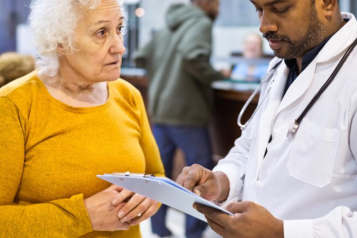Accessing digital healthcare: how well are digital health tools working?

Downloads
What did we do, and who did we speak to?
Before the pandemic, the NHS began initiating an ongoing ‘digital first’ strategy. From physiotherapy to GP appointments, many services are being moved online.
To find out how well this strategy is working for all people, we engaged with a range of organisations and groups from communities across Kensington & Chelsea and Westminster, including a majority of people from black African, South Asian, Arab and Central European communities. These groups we worked with included Midaye Somali Development Network, Macular Society, Groundwork London, One You Westminster, For Women, and Age UK Kensington & Chelsea.
We wanted to better understand how local people experience digital healthcare services like eConsult and System Online. Knowing what is and isn’t working helps us evaluate how inclusive new digital health initiatives are in practice.
What did we find out?
There were a number of recurring issues and themes which emerged over the course of the project. In particular, our report presents three key findings.
Firstly, we found that a clear majority of respondents do not want digital health tools to replace other modes of healthcare. Digital tools must be used as a complement to, rather than a replacement of other modes of service delivery. Service designers must take into account that there are many instances in which people cannot, or do not want to, use digital tools for their healthcare.
Secondly, we found that respondents who don’t speak English, or who have English as an additional language, consistently reported serious issues with the visibility and availability of functioning translation services. In their current state, in-person and online translation services from across the NHS are not fit for purpose.
Thirdly, we found that a majority of respondents told us that they have concerns about security and privacy when using digital health tools. Many people were concerned about sharing personal information via the internet. Others told us that they did not have space in their houses to have confidential conversations with medical professionals without being overheard.
What are our recommendations?
Our report contains a comprehensive set of recommendations for service providers, designed to ensure that digital tools work best for everyone. Our recommendations relate to the availability of face-to-face appointments and consultations, the signposting of information and services, local public health messaging, accessibility, and translation services.
We know that digital health tools can work well and improve the experiences of many people accessing healthcare. However, these improvements must not come at the expense of those who cannot, or do not want to, access healthcare digitally. Above all, we are calling on service providers to ensure that the services they offer remain accessible to all people, regardless of the routes they use to access healthcare.
Listening to local people
As the NHS pushes ahead with its ‘digital first’ strategy, listening to patients’ voices and learning from their experiences remains as important as ever.
We are extremely grateful for the help and support of our community partners who help us to carry out this research. We would like to say a massive thank you to everyone who shared their experiences with us.


